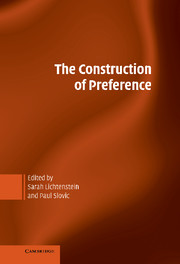Book contents
- Frontmatter
- Contents
- Contributors
- Preface
- Acknowledgments
- I INTRODUCTION
- II PREFERENCE REVERSALS
- III PSYCHOLOGICAL THEORIES OF PREFERENCE REVERSALS
- IV EVIDENCE FOR PREFERENCE CONSTRUCTION
- V THEORIES OF PREFERENCE CONSTRUCTION
- VI AFFECT AND REASON
- 22 Reason-Based Choice
- 23 The Affect Heuristic
- 24 The Functions of Affect in the Construction of Preferences
- 25 Mere Exposure: A Gateway to the Subliminal
- 26 Introspecting About Reasons Can Reduce Post-Choice Satisfaction
- VII MISWANTING
- VIII CONTINGENT VALUATION
- IX PREFERENCE MANAGEMENT
- References
- Index
25 - Mere Exposure: A Gateway to the Subliminal
Published online by Cambridge University Press: 05 June 2012
- Frontmatter
- Contents
- Contributors
- Preface
- Acknowledgments
- I INTRODUCTION
- II PREFERENCE REVERSALS
- III PSYCHOLOGICAL THEORIES OF PREFERENCE REVERSALS
- IV EVIDENCE FOR PREFERENCE CONSTRUCTION
- V THEORIES OF PREFERENCE CONSTRUCTION
- VI AFFECT AND REASON
- 22 Reason-Based Choice
- 23 The Affect Heuristic
- 24 The Functions of Affect in the Construction of Preferences
- 25 Mere Exposure: A Gateway to the Subliminal
- 26 Introspecting About Reasons Can Reduce Post-Choice Satisfaction
- VII MISWANTING
- VIII CONTINGENT VALUATION
- IX PREFERENCE MANAGEMENT
- References
- Index
Summary
Preferences constitute one of the fundamental sources of social and individual stability and change. They give our lives direction and our actions meaning. They influence ideological values, political commitments, the marketplace, kinship structures, and cultural norms. They are sources of attachment and antagonism, of alliance and conflict. No species would evolve if it could not actively discriminate between objects, events, and circumstances that are beneficial and those that are harmful.
Preferences are formed by diverse processes. Some objects, by their inherent properties, induce automatic attraction or aversion. Sucrose is attractive virtually at birth, whereas bitter substances – quinine, for example – are universally aversive. Preferences may also be established by classical or operant conditioning. If a child is rewarded when she sits in a particular corner of the crib, that corner will become a preferred location for her. An office worker whose colleagues notice his new tie will develop a preference for similar ties. Preferences can also be acquired by virtue of imitation, a social process that emerges in fashions. Preferences also arise from conformity pressures. In economics, preference is regarded as the product of rational choice – a deliberate computation that weighs the pros and cons of alternatives.
But among the many ways in which preferences may be acquired, there is one that is absurdly simple, much simpler than rational choice.
- Type
- Chapter
- Information
- The Construction of Preference , pp. 464 - 470Publisher: Cambridge University PressPrint publication year: 2006
- 4
- Cited by



